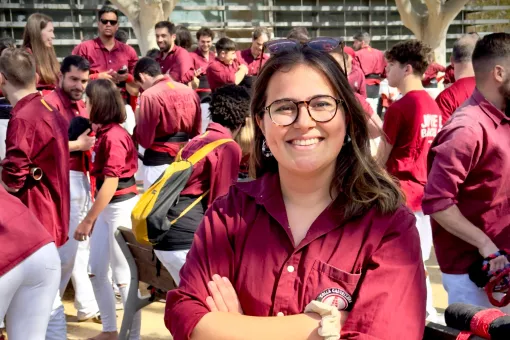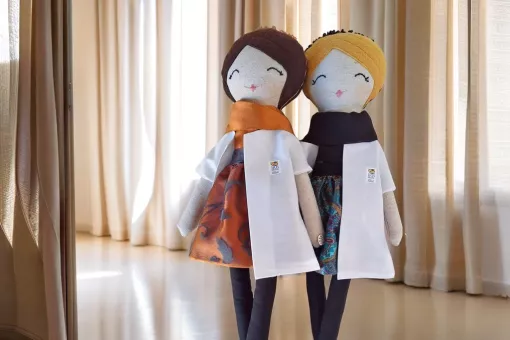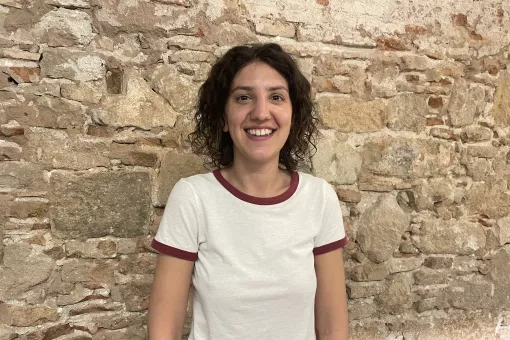Images
“Working in the pharma sector was a progressive decision, but not something I had imagined at the beginning”.
Duarte Mesquita (Lisboa, 1981) joined in 2006 IRB Barcelona’s Development and Morphogenesis in Drosophila Laboratory, to undertake his final degree project in Biotechnical Engineering, mentored by Jordi Casanova and IRB Barcelona alumni Sofía Araújo. After doing a Master in Genetics, he decided to rejoin IRB Barcelona to pursue his doctoral studies at the Development and Growth Control Laboratory, under the supervision of Marco Milán.
Afterwards, Duarte got an EMBO postdoctoral fellowship at the Center for Studies on Chronic Diseases in Lisboa, a position that he combined with a lectureship at the Faculty of Medical Sciences of the NOVA University of Lisbon, while undertaking a Master in Pharmaceutical Medicine at the Universidade Aveiro.
While at IRB Barcelona, Duarte was a member of the PhD student Council and one of the organisers of the first PhD Student Symposium ("The Architecture of Life"). Since 2014, he has been working in the pharmaceutical sector, first in Novartis, and later in 2018 at Sanofi Genzyme (Lisbon), where he currently serves as a Medical Advisor in Immunology and Oncology.
Did you ever imagine yourself working in the pharmaceutical sector?
At the beginning of my career, I came to Barcelona attracted by the idea of living abroad and check if I liked research —and I loved it. Then, while doing my PhD, I attended many training workshops in soft skills, almost always organised by IRB Barcelona, and I did this somehow to think what I would do next —I remember that, in those years, my first child was born in Barcelona. Choosing to go for a postdoc after completing my PhD was probably the “easiest” choice —in the sense that this is the “natural path” that many people take at this point.
When my second child was on his way, I considered undertaking a more complete training, and I chose pharmaceutical medicine. This discipline provides a perspective which covers preclinical studies, clinical studies, and the market. Networking opened the way to a job opportunity at Novartis. Thus, working in the pharma sector was a progressive decision, but not something I had imagined at the beginning.
Tell us about your current role at Sanofi Genzyme.
Sanofi is a big multinational with a complex structure and many business units. In particular, Sanofi Genzyme is the company’s most innovative franchise. My general role is to support internal business with my scientific knowledge but, specifically, my function is to assist medical doctors to make them understand the science underlying pharmacological drugs.
Medical doctors have to deal with a large number of pathologies, and know many drugs to treat them, but often do not have the time to learn more about drugs. It is necessary to establish a relationship with them built on trustfulness and impartiality. This is one of the few areas that has nothing to do with the “business” side of the company.
“IRB Barcelona has been rewarding in many senses: that was my first professional experience, I enjoyed its multidisciplinar, multicultural, international environment, and the complementary training I took there was really helpful”.
At a professional level, how do you think IRB Barcelona contributed to your current career stage?
IRB Barcelona has been rewarding in many senses. Firstly, that was my first professional experience; secondly, I enjoyed its multidisciplinar, multicultural, international environment; thirdly; the complementary training I took at IRB Barcelona was really helpful. I think soft skills such as science communication or entrepreneurship are really necessary; and finally, —and most importantly—, I loved the abounding collaborations that constantly took place within the Institute. I feel like those collaborations are still advantageous today.
I can hardly imagine achieving success without teamwork —and at IRB Barcelona teamwork was amazing. In addition, there I grew at a personal level. Marco Milán is an awesome person who left a mark on me. When we were only three students in his group, he used to say to us that he had to prepare us “for all it could be”.
A piece of advice that you would give to your younger PhD-self?
I think I would do exactly the same. I don’t regret anything I did. I think the most important thing is for you to enjoy what you do, and that you do it with passion, that you be resilient. A PhD has many ups and downs, but if you work hard, you can be home and dry. When you are doing a PhD, it’s not the time to think about what you will do next. It’s time to write your doctoral thesis. Later you will have the time to decide what to do. Enjoy is a must. That is a unique moment, and you have to enjoy it above all.
About IRB Barcelona
The Institute for Research in Biomedicine (IRB Barcelona) pursues a society free of disease. To this end, it conducts multidisciplinary research of excellence to cure cancer and other diseases linked to ageing. It establishes technology transfer agreements with the pharmaceutical industry and major hospitals to bring research results closer to society, and organises a range of science outreach activities to engage the public in an open dialogue. IRB Barcelona is an international centre that hosts 400 researchers and more than 30 nationalities. Recognised as a Severo Ochoa Centre of Excellence since 2011, IRB Barcelona is a CERCA centre and member of the Barcelona Institute of Science and Technology (BIST).





